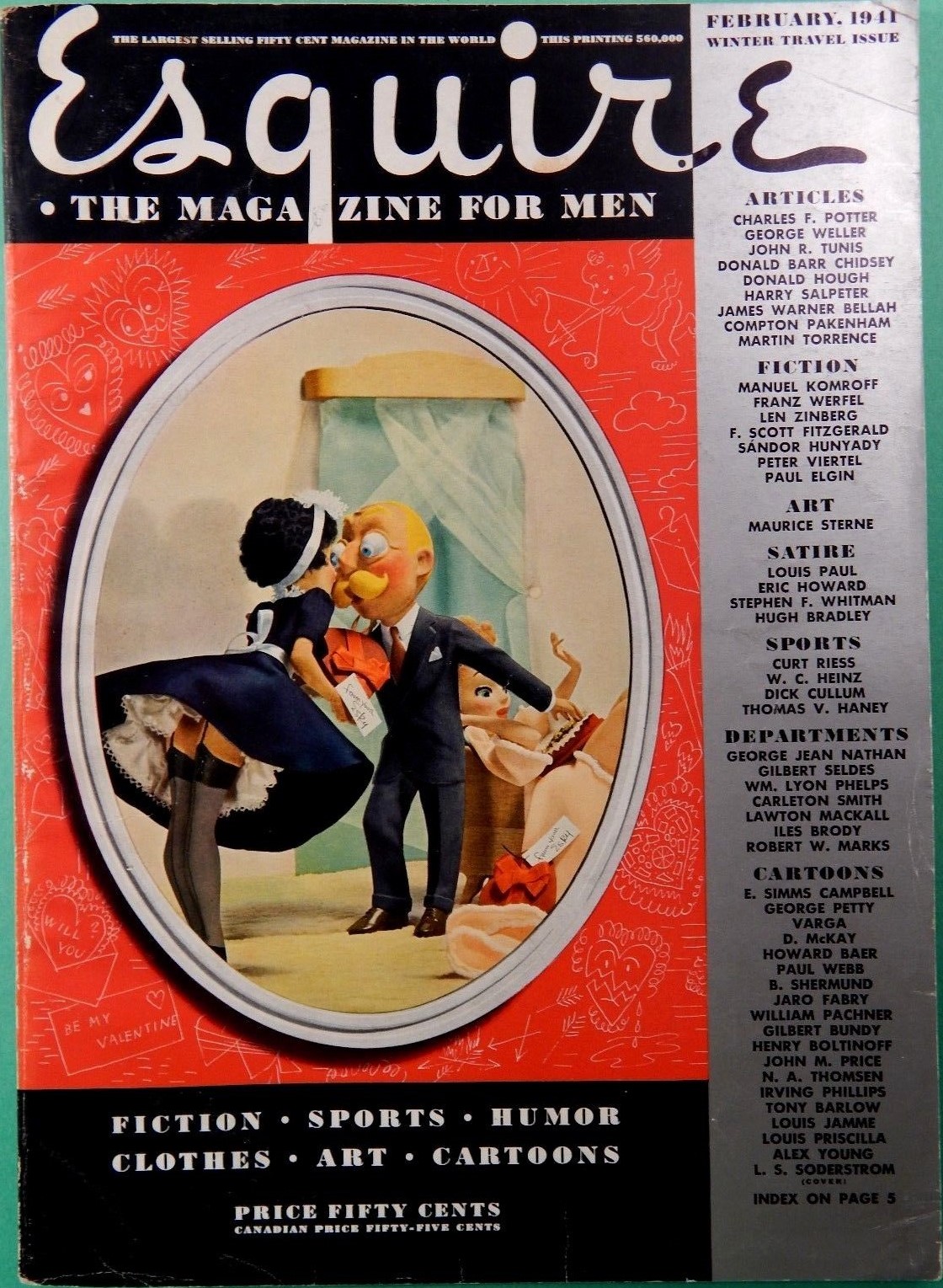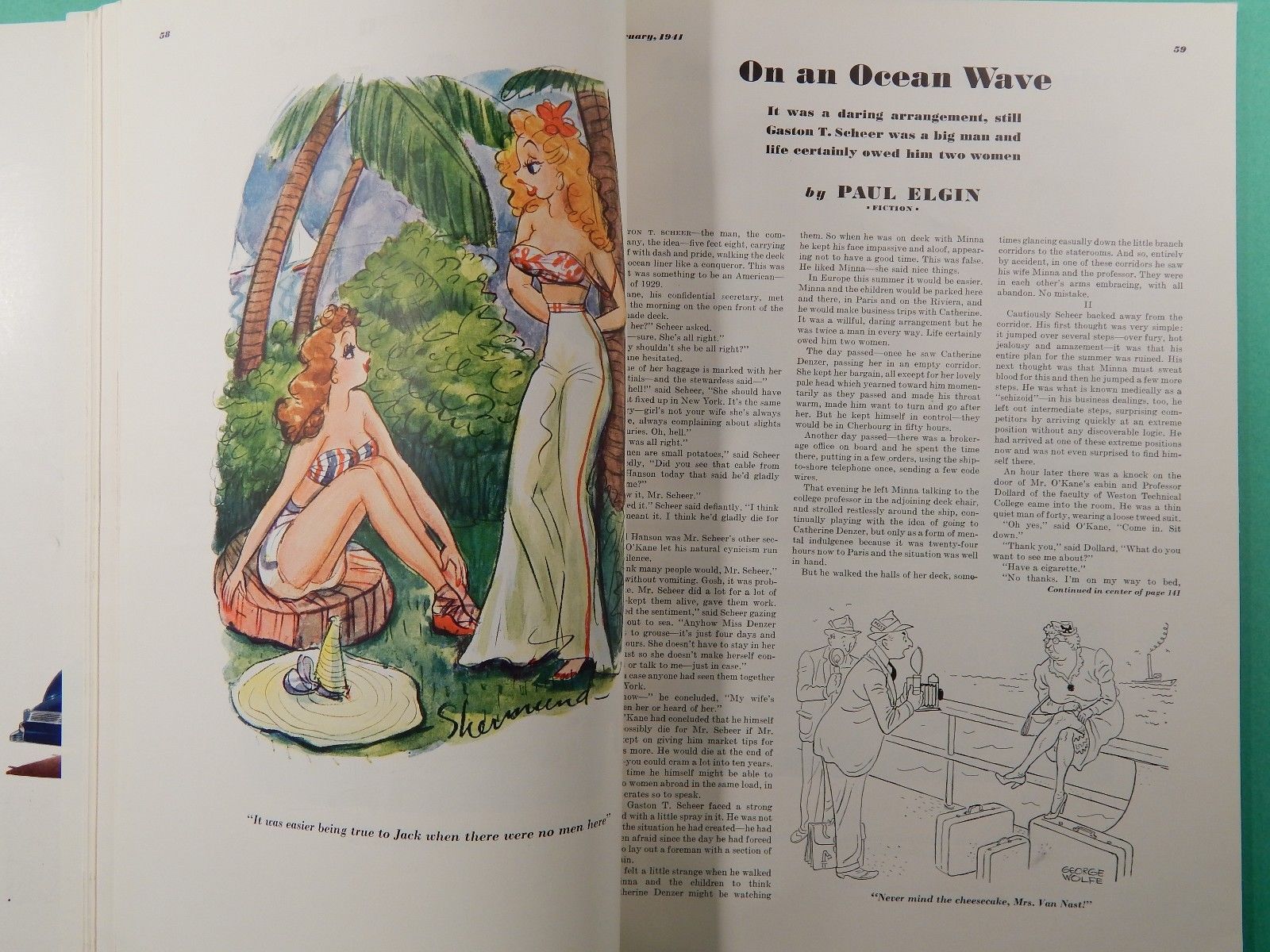
On an Ocean Wave
by Paul Elgin (F. Scott Fitzgerald)
Gaston T. Scheer—the man, the company, the idea—five feet eight, carrying himself with dash and pride, walking the deck of the ocean liner like a conqueror. This was when it was something to be an American—Spring of 1929.
O’Kane, his confidential secretary, met him in the morning on the open front of the promenade deck.
“See her?” Scheer asked.
“Yes—sure. She’s all right.”
“Why shouldn’t she be all right?”
O’Kane hesitated.
“Some of her baggage is marked with her real initials—and the stewardess said——”
“Oh, hell!” said Scheer. “She should have had that fixed up in New York. It’s the same old story—girl’s not your wife, she’s always sensitive, always complaining about slights and injuries. Oh, hell.”
“She was all right.”
“Women are small potatoes,” said Scheer disgustedly. “Did you see that cable from Claud Hanson today that said he’d gladly die for me?”
“I saw it, Mr. Scheer.”
“I liked it.” Scheer said defiantly, “I think Claud meant it. I think he’d gladly die for me.”
Claud Hanson was Mr. Scheer’s other secretary. O’Kane let his natural cynicism run riot in silence.
“I think many people would, Mr. Scheer,” he said without vomiting. Gosh, it was probably true. Mr. Scheer did a lot for a lot of people—kept them alive, gave them work.
“I liked the sentiment,” said Scheer gazing gravely out to sea. “Anyhow Miss Denzer oughtn’t to grouse—it’s just four days and twelve hours. She doesn’t have to stay in her cabin, just so she doesn’t make herself conspicuous or talk to me—just in case.”
Just in case anyone had seen them together in New York.
“Anyhow—” he concluded. “My wife’s never seen her or heard of her.”
Mr. O’Kane had concluded that he himself would possibly die for Mr. Scheer if Mr. Scheer kept on giving him market tips for ten years more. He would die at the end of the ten—you could cram a lot into ten years. By that time he himself might be able to bring two women abroad in the same load, in separate crates so to speak.
Alone, Gaston T. Scheer faced a strong west wind with a little spray in it. He was not afraid of the situation he had created—he had never been afraid since the day he had forced himself to lay out a foreman with a section of pitch chain.
It just felt a little strange when he walked with Minna and the children to think that Catherine Denzer might be watching them. So when he was on deck with Minna he kept his face impassive and aloof, appearing not to have a good time. This was false. He liked Minna—she said nice things.
In Europe this summer it would be easier. Minna and the children would be parked here and there, in Paris and on the Riviera, and he would make business trips with Catherine. It was a willful, daring arrangement but he was twice a man in every way. Life certainly owed him two women.
The day passed—once he saw Catherine Denzer, passing her in an empty corridor. She kept her bargain, all except for her lovely pale head which yearned toward him momentarily as they passed and made his throat warm, made him want to turn and go after her. But he kept himself in control—they would be in Cherbourg in fifty hours.
Another day passed—there was a brokerage office on board and he spent the time there, putting in a few orders, using the ship-to-shore telephone once, sending a few code wires.
That evening he left Minna talking to the college professor in the adjoining deck chair, and strolled restlessly around the ship, continually playing with the idea of going to Catherine Denzer, but only as a form of mental indulgence because it was twenty-four hours now to Paris and the situation was well in hand.
But he walked the halls of her deck, sometimes glancing casually down the little branch corridors to the staterooms. And so, entirely by accident, in one of these corridors he saw his wife Minna and the professor. They were in each other’s arms embracing, with all abandon. No mistake.
II
Cautiously Scheer backed away from the corridor. His first thought was very simple: it jumped over several steps—over fury, hot jealousy and amazement—it was that his entire plan for the summer was ruined. His next thought was that Minna must sweat blood for this and then he jumped a few more steps. He was what is known medically as a “schizoid”—in his business dealings, too, he left out intermediate steps, surprising competitors by arriving quickly at an extreme position without any discoverable logic. He had arrived at one of these extreme positions now and was not even surprised to find himself there.
An hour later there was a knock on the door of Mr. O’Kane’s cabin and Professor Dollard of the faculty of Weston Technical College came into the room. He was a thin quiet man of forty, wearing a loose tweed suit.
“Oh yes,” said O’Kane. “Come in. Sit down.”
“Thank you,” said Dollard. “What do you want to see me about?”
“Have a cigarette.”
“No thanks. I’m on my way to bed, but tell me, what’s it about?”
O’Kane coughed pointedly—whereupon Cates, the swimming-pool steward, came out of the private bathroom behind Dollard and went to the corridor door, locking it and standing in front of it. At the same time Gaston T. Scheer came out of the bathroom and Dollard stood up, blushing suddenly dark as he recognized him.
“Oh, hello—” he said, “—Mr. Scheer. What’s the idea of this?” He took off his glasses with the thought that Scheer was going to hit him.
“What are you a professor of, Professor?”
“Mathematics, Mr. Scheer—I told you that. What’s the idea of asking me down here?”
“You ought to stick to your job,” said Scheer. “You ought to stick there in the college and teach it and not mess around with decent people.”
“I’m not messing around with anybody.”
“You oughtn’t to fool around with people that could buy you out ten thousand times—and not know they spent a nickel.”
Dollard stood up.
“You’re out of your class,” said Scheer. “You’re a school teacher that’s promoted himself out of his class.”
Cates, the steward, stirred impatiently. He had left the two hundred pounds in cash in his locker and he wanted to have this over with and get back and hide it better.
“I don’t know yet what I’ve done,” Dollard said. But he knew all right. It was too bad. A long time ago he had decided to avoid rich people and here he was tangled up with the very worst type.
“You stepped out of your class,” said Scheer thickly, “but you’re not going to do it any more. You’re going to feed the fishes out there, see?”
Mr. O’Kane, who had bucked himself with whiskey, kept imagining that it was Claud Hanson who was about to die for Mr. Scheer—instead of Professor Dollard who had not offered himself for a sacrifice. There was still a moment when Dollard could have cried out for help but because he was guilty he could not bring himself to cry out. Then he was engrossed in a struggle to keep breathing, a struggle that he lost without a sigh.
III
Minna Scheer waited on the front of the promenade deck, walking in the chalked numbers of the shuffle-board game. She was excited and happy. Her feet as she placed them in the squares felt young and barefoot and desperate. She could play too—whatever it was they played. She had been a good girl so long, but now almost everybody she knew was raising the devil and it was a thrilling discovery to find that she could join in with such pleasure. The man was late but that made it all the more tense and unbearably lovely, and from time to time she raised her eyes in delight and looked off into the white hot wake of the steamer.
“On an Ocean Wave,” written in the summer of 1940, was the only Fitzgerald story published under a pseudonym. The disguise was his idea, and he originally proposed it to Arnold Gingrich in February 1940 for “Three Hours Between Planes”: “Why don’t you publish it under a pseudonym—say, John Darcy? I’m awfully tired of being Scott Fitzgerald anyhow, as there doesn’t seem to be so much money in it, and I’d like to find out if people read me just because I am Scott Fitzgerald or, what is more likely, don’t read me for the same reason. In other words it would fascinate me to have one of my stories stand on its own merits completely and see if there is a response.” It is likely that the real reason was Fitzgerald’s suspicion that the Pat Hobby stories had typed him. Moreover, he wanted to accelerate publication of the stories Esquire was holding until the Hobby series was completed. Although “On an Ocean Wave” was published posthumously, it had been scheduled before Fitzgerald died and appeared in the same issue as “Fun in an Artist’s Studio.”
“On an Ocean Wave” was not a new departure for Fitzgerald. The treatment of Scheer is uncharacteristically hard-boiled; but the style is recognizable, as in the final paragraph which might have been written for one of Fitzgerald’s Twenties stories. Published in Esquire, February 1941.
Published in Esquire magazine (February 1941); NB. - this issue also included Fun in an Artist’s Studio, by F. Scott Fitzgerald.
No illustrations.

